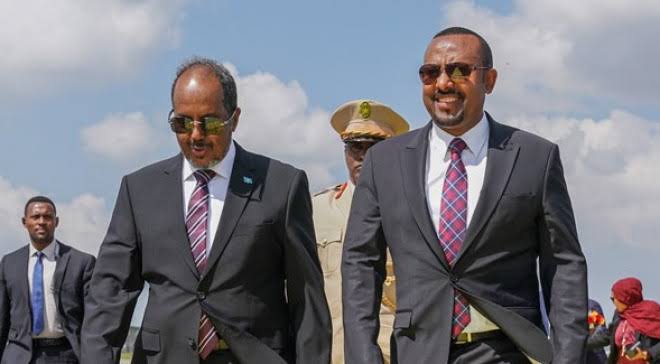Facebook Twitter (X) Instagram Somali Magazine - People's Magazine
Somalia’s President Hassan Sheikh Mohamud arrived in Ethiopia on Saturday as both nations seek to strengthen diplomatic ties following a recent peace agreement aimed at reducing tensions in the Horn of Africa. The visit, requested by Ethiopian Prime Minister Abiy Ahmed, comes after a year of strained relations sparked by Ethiopia’s controversial deal with Somaliland, the breakaway region of Somalia.
Ethiopia, a landlocked country, has long sought access to the Red Sea for strategic economic and military purposes. The diplomatic strain escalated when Ethiopia signed an agreement with Somaliland in 2024, reportedly promising to recognize Somaliland’s independence in exchange for port access and a military base on the Red Sea. This move deeply angered Somalia, which views Somaliland as part of its sovereign territory.
The tensions were somewhat alleviated last month when Mohamud and Abiy signed a peace deal in Ankara, Turkey, mediated by Turkish President Recep Tayyip Erdogan. Mohamud’s office stated that the Addis Ababa visit was intended to build on the Ankara agreement, emphasizing renewed collaboration between the neighboring countries. Ethiopian state media shared images of Abiy welcoming Mohamud upon his arrival.
Despite the recent diplomatic gestures, significant concerns remain unresolved. One of the primary sticking points is Ethiopia’s continued ambition for sea access. While Erdogan hinted that the peace deal could eventually provide Ethiopia with a maritime route, the specifics of how this would be achieved remain unclear. Additionally, the status of Ethiopia’s prior agreement with Somaliland remains ambiguous, further complicating the fragile diplomatic landscape.
Tensions were further evident in Cairo, where Somalia’s Foreign Minister Ahmed Moalim Fiqi met with his Egyptian and Eritrean counterparts. The foreign ministers expressed a unified stance against external interference in the Red Sea region, indirectly criticizing Ethiopia’s ambitions. Egyptian Foreign Minister Badr Abdelatty stressed that control over the Red Sea should be limited to countries with a direct coastline, emphasizing that any military or naval presence from non-coastal states would be unacceptable.
Egypt, Eritrea, and Somalia recently solidified a regional alliance aimed at countering Ethiopia’s maritime ambitions. This coalition, formalized in October during a summit in Eritrea’s capital, Asmara, has led to increased diplomatic and military cooperation among the three nations. Egypt has also expanded its military involvement in Somalia, recently contributing troops to the African Union Support and Stabilisation Mission in Somalia (AUSSOM), a coalition fighting al-Shabaab militants.
The evolving dynamics highlight the broader geopolitical struggles in the Horn of Africa, where maritime access, sovereignty, and regional power play are closely intertwined. For Ethiopia, securing sea access is crucial for its long-term economic growth and security, given its landlocked position since Eritrea’s independence in 1993. However, Somalia views any compromise involving Somaliland as a direct threat to its territorial integrity.
As Mohamud and Abiy pursue further dialogue, regional observers remain skeptical about the sustainability of peace in the region without clearer commitments from both sides. Ethiopia’s engagement with Somaliland continues to provoke strong reactions from Somalia, while the unresolved issue of Red Sea access could trigger further diplomatic confrontations.
The Horn of Africa remains a hotspot for international attention, with major powers like Turkey and Egypt actively involved in mediating or influencing regional dynamics. Both Ethiopia and Somalia face domestic challenges, including insurgencies and political instability, making external diplomatic tensions even more complex to navigate.
Ultimately, the success of Mohamud’s visit to Ethiopia will depend on whether both nations can find mutually acceptable solutions to their maritime disputes without compromising sovereignty claims. The coming weeks will likely determine whether the Ankara agreement marks a turning point or merely a temporary pause in the region’s long-standing tensions.

